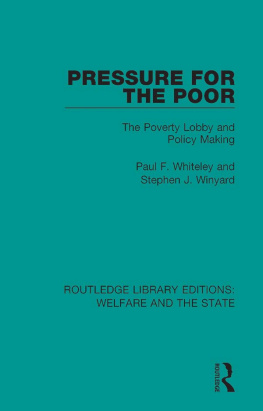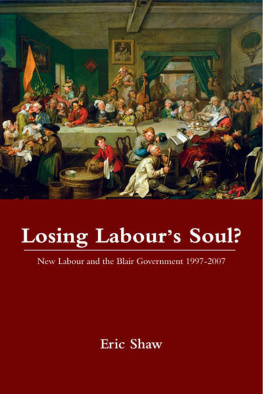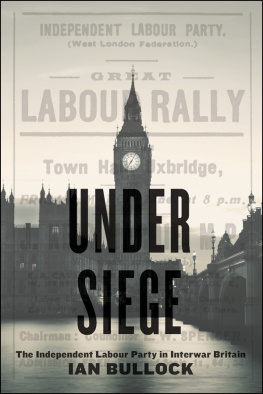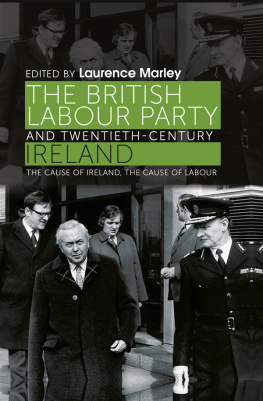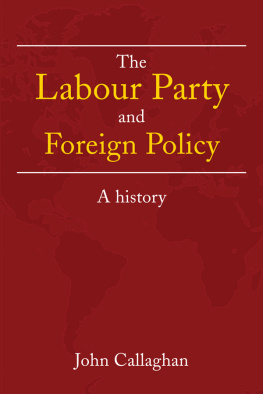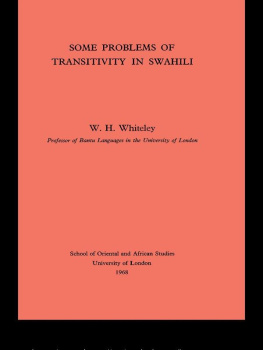ROUTLEDGE LIBRARY EDITIONS:
THE LABOUR MOVEMENT
Volume 43
THE LABOUR PARTY IN CRISIS
THE LABOUR PARTY IN CRISIS
PAUL WHITELEY
First published in 1983 by Methuen & Co. Ltd
This edition first published in 2019
by Routledge
2 Park Square, Milton Park, Abingdon, Oxon 0X14 4RN
and by Routledge
711 Third Avenue, New York, NY 10017
Routledge is an imprint of the Taylor & Francis Group, an informa business
1983 Paul Whiteley
All rights reserved. No part of this book may be reprinted or reproduced or utilised in any form or by any electronic, mechanical, or other means, now known or hereafter invented, including photocopying and recording, or in any information storage or retrieval system, without permission in writing from the publishers.
Trademark notice: Product or corporate names may be trademarks or registered trademarks, and are used only for identification and explanation without intent to infringe.
British Library Cataloguing in Publication Data
A catalogue record for this book is available from the British Library
ISBN: 978-1-138-32435-0 (Set)
ISBN: 978-0-429-43443-3 (Set) (ebk)
ISBN: 978-1-138-32646-0 (Volume 43) (hbk)
ISBN: 978-0-429-44982-6 (Volume 43) (ebk)
Publishers Note
The publisher has gone to great lengths to ensure the quality of this reprint but points out that some imperfections in the original copies may be apparent.
Disclaimer
The publisher has made every effort to trace copyright holders and would welcome correspondence from those they have been unable to trace.
PAUL WHITELEY
THE
LABOUR
PARTY
IN CRISIS
METHUEN LONDON AND NEW YORK
Contents
First published in 1983 by
Methuen & Co. Ltd
11 New Fetter Lane,
London EC4P 4EE
Published in the USA by
Methuen & Co.
in association with Methuen, Inc.
733 Third Avenue, New York,
NY 10017
1983 Paul Whiteley
Typeset in Great Britain by
Scarborough Typesetting Services
and printed by
Richard Clay, The Chaucer Press,
Bungay, Suffolk
All rights reserved. No part of this book may be reprinted or reproduced or utilized in any form or by any electronic, mechanical or other means, now known or hereafter invented, including photocopying and recording, or in any information storage or retrieval system, without permission in writing from the publishers.
British Library Cataloguing in Publication Data
Whiteley, Paul
The Labour Party in crisis.
1. Labour Party (Great Britain)
I. Title
324.24107 JN1129.L32
ISBN 0416338607
ISBN 0416338704 Pbk
Library of Congress Cataloging in Publication Data
Whiteley, Paul.
The Labour Party in crisis.
Bibliography: p.
Includes index.
1. Labour Party (Great Britain)
2. Great Britain Politics and government 1945- I. Title.
JN1129.L32W48 1983 324.24107 8313176
ISBN 0416338607
ISBN 0416338704 (pbk.)
To Susie, Helen, Tom and Alice
The decline in Labour Party individual membership, 195078
The relationship between the Labour and Conservative shares of the total vote and time, 194579
Distribution of respondents along the left-right ideology scale
The decline of Labours published individual membership, 195078
The relationship between individual party membership and inflation, 195078
The relationship between individual party membership and unemployment, 195078
A theoretical model of voting in Britain
A multiple interrupted time series analysis of a hypothetical economic series
The factor analysis of the issue indicators for Labour identifiers in 1979
Responses of pooled sample to attitudinal indicators
The factor analysis for the Labour elite, and correlations between factors
The relationship between attitudinal indicators and the first principal component
Occupational status by ideology for the pooled sample
The relationship between ideology and political status in the Labour elite
Social background, political status and attitude saliency as predictors of ideology
The discrepancy between the attitudes of the Labour elite and the Labour governments performance in office
Attitudes of the Labour elite (Members of Parliament, parliamentary candidates and councillors) to the public ownership of industries and services in the long run
Membership and activism in constituency Labour parties, 1978
The relationship between social class and motives for joining the Labour Party
The relationship between ideology and political orientation for party conference delegates
Factor analysis of the attitudes of middle-class conference delegates
Factor analysis of the attitudes of working-class conference delegates
Economic variables as predictors of Labours individual membership, 196078, controlling for confounding influences ordinary least squares estimates
The relationship between social attributes, affective, prospective and retrospective evaluations and Labour voting, 1979
Social attributes, affective, prospective and retrospective evaluations as predictors of the probability of voting Labour
Social attributes, affective, prospective and retrospective evaluations altogether as predictors of the probability of voting Labour
Correlations between affective, retrospective and prospective evaluations of issues
The main economic indicators, 195979
Generalized least squares estimates of the influence of Labour incumbency on economic time series
The social security budget in 19823 the main elements
The distribution of individuals, by household income relative to the supplementary benefits line and type of family, 1975
The distribution of individuals, type of family by household income relative to the supplementary benefits line
Changes in numbers of beneficiaries, 196079
The changes in real terms in social security benefits, 196479
Social security benefits as a percentage of average earnings for last increases of various governments, 195179
The results of the 1983 General Election in Great Britain
Levels of party support at key times from 1979 to 1983
The electorates evaluation of party performances in the 1983 General Election
It is always difficult to acknowledge the intellectual debts one owes to individuals within and outside academic life. Many people have helped me to write this book. I should like to thank particularly Ian Budge of the University of Essex for his valuable comments on earlier drafts of Part I; Steve Winyard of the University of Leeds for his help in organizing in my mind the mass of material summarized in Chapter 7; and Norman Schofield of the California Institute of Technology, formerly of the University of Essex, for his stimulating conversation and his profound insights into the nature of collective action. I should also like to thank friends in the Department of Political Science at the University of Kentucky, particularly Mike Baer, who provided a stimulating academic environment in which to work whilst the structure of this book was being developed. I should also like to thank Steve Kelly of the Computer Centre at the University of Bristol for his help with software.




